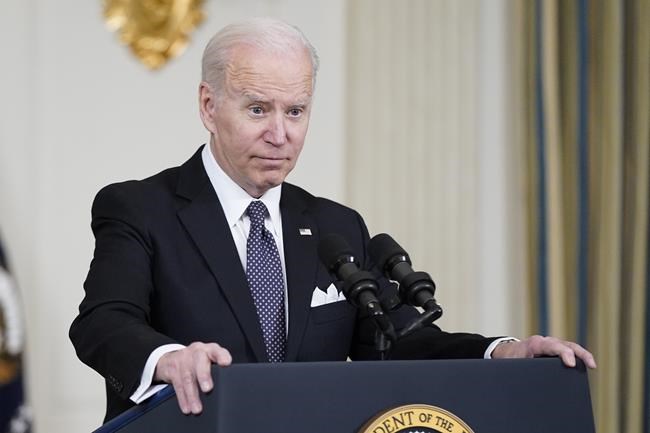Biden says remark on Putin’s power was about ‘moral outrage’
Advertisement
Read this article for free:
or
Already have an account? Log in here »
To continue reading, please subscribe:
Monthly Digital Subscription
$0 for the first 4 weeks*
- Enjoy unlimited reading on winnipegfreepress.com
- Read the E-Edition, our digital replica newspaper
- Access News Break, our award-winning app
- Play interactive puzzles
*No charge for 4 weeks then price increases to the regular rate of $19.00 plus GST every four weeks. Offer available to new and qualified returning subscribers only. Cancel any time.
Monthly Digital Subscription
$4.75/week*
- Enjoy unlimited reading on winnipegfreepress.com
- Read the E-Edition, our digital replica newspaper
- Access News Break, our award-winning app
- Play interactive puzzles
*Billed as $19 plus GST every four weeks. Cancel any time.
To continue reading, please subscribe:
Add Free Press access to your Brandon Sun subscription for only an additional
$1 for the first 4 weeks*
*Your next subscription payment will increase by $1.00 and you will be charged $16.99 plus GST for four weeks. After four weeks, your payment will increase to $23.99 plus GST every four weeks.
Read unlimited articles for free today:
or
Already have an account? Log in here »
Hey there, time traveller!
This article was published 28/03/2022 (1355 days ago), so information in it may no longer be current.
WASHINGTON (AP) — President Joe Biden said Monday that he would make “no apologies” and wasn’t “walking anything back” after his weekend comment that Russian President Vladimir Putin “cannot remain in power.” The president also insisted he’s not calling for regime change in Moscow.
“I was expressing the moral outrage that I felt toward this man,” Biden said. “I wasn’t articulating a policy change.”
The president’s jarring remark about Putin, which came at the end of a Saturday speech in Warsaw that was intended to rally democracies for a long global struggle against autocracy, stirred controversy in the United States and rattled some allies in Western Europe.

Biden on Monday rejected the idea that his comment could escalate tensions over the war in Ukraine or that it would feed Russian propaganda about Western aggression.
“Nobody believes … I was talking about taking down Putin,” Biden said, adding that “the last thing I want to do is engage in a land war or a nuclear war with Russia.”
He said he was expressing an “aspiration” rather than a goal of American foreign policy.
“People like this shouldn’t be ruling countries. But they do,” he said. “The fact they do doesn’t mean I can’t express my outrage about it.”
United Nations Secretary General Antonio Guterres had responded to Biden’s weekend comment by saying earlier Monday that “we need de-escalation. We need military de-escalation and rhetoric de-escalation.”
French President Emanuel Macron on Sunday had said he “wouldn’t use those terms, because I continue to speak to President Putin, because what do we want to do collectively? We want to stop the war that Russia launched in Ukraine, without waging war and without escalation.”
Secretary of State Antony Blinken was forced to continue clarifying Biden’s speech during a trip through the Middle East, where he had intended to focus on solidifying American partnerships as the administration seeks a renewed nuclear agreement with Iran.
Speaking at a news conference in Jerusalem, Blinken said Biden meant that “Putin cannot be empowered to wage war or engage in aggression against Ukraine or anyone else.”
Although the White House had insisted after the speech that Biden was not calling for regime change, Republicans questioned why he decided to go off-script when dealing with a combustible conflict.
Some said Biden’s provocative rhetoric was strange given his otherwise cautious approach, such as refusing to facilitate the transfer of Polish fighter jets to Ukraine’s military.
“If we’re so worried about provoking him that we couldn’t even send MiGs into Ukraine, how is this any different?” Rep. Michael McCaul, R-Texas, told CNN’s “State of the Union” on Sunday. “In fact, I would say it’s more provocative than sending MiGs into Ukraine.”
The U.S. has been rushing weapons like anti-tank missiles into Ukraine, and is considering providing anti-ship missiles to make it harder for Russia to mount an amphibious offensive along the Black Sea coast.
Ukrainian President Volodymyr Zelenskyy remains exasperated with the pace of military assistance, accusing Western leaders of cowardice and repeating his request for tanks and fighter jets.
__
Associated Press writer Edith Lederer contributed to this report from the United Nations.




